Dark Imperium: Plague War Read online
Page 2
Guilliman required so little of him. Mathieu’s assessment of the position of militant-apostolic as a mouthpiece was accurate. He was called upon from time to time to advise the primarch on how to handle the church, or to deliver oratory to one gathering or another. Often, Guilliman rewrote his sermons.
Mathieu filled his time with service to the Emperor as he understood it. As he had gone among the poor and sick on the worlds of Ultramar, now he went among the Chapter and vessel serfs that served aboard the Macragge’s Honour, dispensing alms or medical aid, and bringing spiritual comfort. In the dingy chapels of the lower decks he spoke of the Emperor’s mercy. Baseline humans in the fleet were discouraged from religious demonstrations, for the Ultramarines found open worship distasteful, but they were not forbidden their beliefs either. Mathieu gave them what comfort he could. Their lives were hard. He pitied them.
At other times he wrote. Partly he wrote in slavish imitation of the sainted primarch, whose every spare moment was spent in his scriptorium. Mainly it was because he believed the deeds of Roboute Guilliman should be recorded by one of the faithful for the faithful, and not only preserved in the obscurity of the Ultramarines librarium.
Mathieu turned to the next blank page and opened his inkwell. He looked away from the book, his fingers spread on the paper, and took a moment to steady himself, clear his mind and make his soul ready for the sacred task. Only then did he take up his quill, dip the nib into black ink and meticulously write an ornate title.
The Sainted Guilliman’s triumph upon Espandor against the horrors of the unclean powers.
He drew the letters slowly, filling the bubbles of each with decorative flourishes. Later, should the writing still stand up to his critical eye, he would expand these efforts at illumination, illustrating the document with fine pictures. For now, he sketched in a few ideas, only lightly so he might easily scrape them out. Once done, he thought a moment on whether to name himself as the author of the chapter. He wavered, then decided he would, and wrote quickly before he could change his mind.
As related by Militant-Apostolic Frater Mathieu of the Acronite Mendicants, third line postulant, who was present personally during the campaign.
He regretted his vanity as soon as he finished the sentences. Before commencing each instalment he had the same fruitless inner battle. Knowing only too well how fragmented documents could become over time, he had put his name under every chapter heading. Although he had been there on Espandor, and intended to refer to sights he had seen with his own eyes, there was little need to attribute the writing, less still to point out who he was and who he had been. His story was not the point, the primarch’s was, and yet he yearned to be recognised as its author. There was twofold pride in that sentence, in stating his exalted rank, and in insisting his humble origins so that all would know how high he had risen.
He meditated a moment, asking the Emperor for forgiveness. He resolved to write the entire account of the war, then remove his name. That was the way. He would continue with his ritual debate until the end, then purge himself from the account.
Breathing evenly so as not to disturb his penmanship, he started his story.
Upon Espandor, the Sainted Guilliman did drive back the forces of the dread primarch Mortarion, may he forever be condemned to suffering the Emperor’s punishments for his treachery. With great force and intelligence, the Imperial Regent Guilliman, the last and most faithful of the sons of the living God-Emperor, did set his forces against those of the unspeakable ones, and so remove them from the world and its attendant subject planets. And in the star systems close by he attacked with such aggressive certainty of victory that the fell voidcraft of the enemy were pushed out, and the blockade lifted, so Espandor was brought relief. The cities were retaken, and in them all the Sainted Guilliman wept to see the temples of his father profaned, and the servants of Terra much reduced by sickness and by war, so that only a tenth of the peoples of Espandor who had been before living remained in the Sainted Guilliman’s service, and that of Ultramar, and of He who rules from Terra.
For fifteen days the primarch did battle across Espandor, overthrowing the hegemony of daemons and Heretic Astartes alike. By cunning strategy, he drove them before himself, breaking their might and annihilating them piecemeal with his fury. With lightning strike and surprise assault, he divided the enemy and so overcame them. At the Spires of Priandor he cast down the rusting daemon-golems of the fallen Legio Onerus. The river of Gangatellium ran black with daemonic ichor so deep that to purify its waters required the prayers of twenty-two high cardinals. In the provinces of Berenica, Ebora and Iorscira the enemy were routed and slain. So swift and terrible was the primarch’s advance that all went to disarray before him, whether daemon, mortal, or undying legionary. At every clash the primarch led, the sword of his father flamed bright in his grasp. About the Sainted Guilliman the protection of His angels and His saints burned bright in a terrible nimbus that lit the souls of the faithful with great strength, and smote the servants of the enemy wheresoever it did shine upon them. The minions of the Plague Lord, who feed upon despair and hopelessness, knew despair themselves. Yea! And their skin did smoke at the light’s touch, and their wargear faileth, and the machine things that should not be fell into steaming parts, and were sent out of this realm forever.
Seven battles the primarch waged in defiance of the Plague Lord’s unholy number, for seven brings the Plague Lord power. The seventh battle was the greatest of all.
At the commencement of every fight, Guilliman strode forth out before his armies and spake these words for all to hear.
‘I am the Primarch Roboute Guilliman, fury of the Emperor! These worlds are under my protection. You will be driven out, and cast down, and all your number slain. There shall be no mercy for you who have turned your back on the holy light of Terra, and defied the divine grace of the Emperor. I call to you, and say, present unto me the arch-traitor Mortarion, my brother, fallen primarch and high daemon, and I shall take him, and slay him, and your multitudes will know the mercy of a swift death.’
I, Militant-Apostolic Mathieu, know these to be true accounts, for I was there at the Sainted Guilliman’s side, and fought in the Emperor’s name in the primarch’s sight.
Naturally, Guilliman had not phrased his challenges quite like that, and there was maybe a little bit of flourish around the displays of the primarch’s power. But Mathieu was convinced that the Emperor fought alongside His son. He could practically see Him. One day Guilliman would believe the truth of his father’s nature, and thank Mathieu for showing him the path to faith. What he wrote might not be strictly accurate, but it was truthful, he was sure of that.
These minor additions bothered him not in the least, but another part did cause him disquiet.
His shameful pride had resurfaced. He chewed his lip in anguish, rereading the lines where he mentioned himself. He had fought there. The Emperor’s name was ever on his lips. That, more than the bolts of light his holy gun had fired, had brought many fell beings to ruin. He was, however, far from unique. Many other faithful warriors of the Imperium had lent prayer and las-blast to the charge. Their names were not recorded, why should his be? But then, was it so very wrong to recount his own, modest part in these struggles? In many hagiographies the narrator regaled the reader with their own deeds at the sides of the saints. On the other hand, how many other accounts had he read where there seemed to be no connection between teller and tale because the writer had let modesty win out, when their own deeds had been greater even than Mathieu’s, so as to better honour their subject?
Mathieu’s neck flushed. He was tempted to scratch the last sentence out. He had not intended to include it. Pride moved his hand.
His pen hovered over the offending line. Another memory stopped him. Guilliman had said to him after the battle of the Cooling Spire on Espandor’s scorching equator that he had fought well. The approval of the primarch ha
d been bestowed upon him. Had he not won the right to celebrate himself, if only a little?
He set aside the question for the time being. He was due on the lower decks soon, and he wished to finish before he went. A swift jolt from his auto-flagellator refocused his mind. Once the pain faded, he recommenced his work. The scratching of the pen cast its spell, and he fell into the storyteller’s rhythm.
The power of the enemy was broken by degree. No final glorious struggle was fought upon Espandor, for the enemy was craven and would not be brought to battle, preferring instead the quiet ways of disease and despair. By many hundreds of desperate skirmishes were they finally rooted out. Dirty and hard the struggle was, and seemingly without end. Sickness and maladies of the soul took their toll on all but the most faithful of the Emperor’s servants. But by His mercy the forces of evil are not infinite in their number, and so in this way was Espandor retaken piece by piece, until but small groups of the enemy remained upon its sacred earth, and these were ringed about by the siege lines of the avenging hosts, and marked by them for cleansing violence in due course.
Unto his lieutenants the primarch gave the final tasks of Espandor. War raged across the firmament, yea, from Talasa unto Iax and all places between those systems. In this, wise Lord Guilliman spake to his generals.
‘A single man cannot in every place be, but he might move swiftly, and bring the full force of his might to bear upon the weakest places, and so with pressure crack the walls of the enemy, and shatter his line of supply. Thusly shall we triumph, and make Ultramar clean again.’
So speaking, he took his leave, and with him went fully eighty-nine point three per cent of his armies. From the blighted forests of Espandor did the Lord Primarch Roboute Guilliman set out with mighty host in train, driving his course towards Parmenio where the forces of dread Chaos gathered in great multitude.
This was better, Mathieu thought. More honest.
The warp was in awful tempest as the sainted primarch travelled, and the great vessel Adarnaton was lost with all hands, and others scattered far. The light of the Astronomican did flicker dimly, and be obscured for a space of time, and the fleet was sundered. Lo! And the holy fields of Geller did break, and daemons run amok amid the ships of the Emperor’s servants, and the primarch fought alongside his sons and with the lesser men, and did drive the warp spawn from his ship, and by his example did inspire other men to do the same.
The faithful raised shouted prayer to their Emperor as they fought, and the light of the beacon burned true again, and the warp calmeth, and what daemons did remain were burned by the hymns of the faithful, so that soon no unclean creature remained, and those men struck by unnatural sicknesses were miraculously made well, and those close to death rose up and were become hale!
I saw this. I was there.
He grimaced. He had done it again. This time, he upped the output of his pain device so much that he cried out at its activation.
The expanses of the empyrean thereafter calmed to perfect smoothness, for the Emperor of all Mankind commanded it to be so, and in good time the primarch’s fleet made translation at the Tuesen System, which lies not far from the Parmenio System, and there regathered with much relief, for ships thought lost were brought home into the fold, and losses made good.
Sundry undertakings were ordered to make the fleet fit once more, and a layover of three Terran weeks decreed.
On the ninth day there was a great rejoicing when the sky was rent and from out of the warp came one hundred and one ships in the service of the God-Emperor. Many loyal children of men journeyed from across the Imperium, seeming as if by chance, and Guilliman’s warhost was greatly fortified by this good fortune. Taking his opportunity, Guilliman bade all his astropaths sing out a message without fear, for the warp was at rest, and he told them to summon what other aid they could to Ultramar, for many men under arms and war machines had come already at his command, but more he would have.
And then did he retreat to his strategium awhile, and set himself into thought.
He emerged ten hours later, and lo! was there the promise of victory upon his face, and a light did shine about his head. ‘Tell my finest astropaths to speak with their brothers upon the star fortress Galatan, and bring it hence to orbit around the prime world of Parmenio, and rain its fire down upon the unbelievers and the faithless, for in this way am I sure to destroy my brother, and undo the works of the unspeakable Plague God.’
Immaterial breach was made without incident, and in fine array the ships sailed again upon the seas of the empyrean where the light of the Emperor may be witnessed, and His eye is upon all.
From Tuesen, Parmenio was but two weeks’ journey, and the beacon light in the empyrean blazed strongly, and the soul seas between were much becalmed, so that the Navigator of the Macragge’s Honour, Guilliman’s great conveyance, did come down from his navigatorium to speak in wonder and in faith of the sights he had seen upon the currents of that Other Place. Of angels, and of saints, and walls of gold that held back the tides of evil that would drown us all, and take out our souls from our bodies.
By the grace of the Emperor, messages passed between the fleet and the fortress of Galatan, whose power was commanded that day by Chapter Master Bardan Dovaro of the Novamarines. Dovaro promised fealty, and immediate obedience, but delivered his utmost apologies. The star fortress, stationed then at Drohl, was slow in its hugeness, and so was delayed by dint of its own might, for verily it mounted many guns and carried a great host of the Emperor’s warriors, and much labour was needed to bring it out of Drohl thence to Parmenio. The Avenging Son would not wait, but told Dovaro to come as fast as he might, and upon arrival deploy the ancient power of Galatan in the Imperium’s favour.
Guilliman was resolved to make haste to the prime world of the Parmenio System with the greater part of his armies, where the enemy gathered all but exclusively, and there to save those of the good people of the Imperium that he might from painful death and the soul oblivion. Victory was assured by His decree, for the Emperor protects, as all faithful men and women know.
Chapter Two
Rogue Trader
Mathieu laid aside his pen. He had kept matters concise. He had not told too much of his own efforts on Espandor or the worlds close by. He did not write of the prayers he had shouted that had unravelled daemons. He did not speak of the miraculous shot, taken from fifty metres, that had drilled out a plaguebearer’s sole eye and saved a Sister of Silence from death, nor of the benedictions and comforts he had given to the dying. He did not speak of walking into the poison fogs of the Death Guard, or bearing the toxins of their weapons without sickness.
In any other circumstances his own actions would have been noteworthy. In comparison to the deeds of the primarch they were nothing. He was glad to live in such heroic times.
‘Perhaps I have not been too vain,’ he said, though he did not believe it completely.
He was late. He had spent too long indulging himself. He had duties to perform. Hurriedly he sanded his final words with pounce, let the ink dry, and closed his book.
Sirens warbled all over the ship, signalling five minutes until watch change for the thousands of mortal crew. He left the book where it was. Nobody ever came down there, and he had nothing to hide by anyone reading it.
Did he in fact want someone to read it? He dithered, thinking perhaps he should hide it. Was it prideful to leave the book out to be found? Was it yet more vanity to suppose it so important it must be hidden?
He tapped the cover thoughtfully and let it be. He would atone for his pride with prayer and mortification. Next time he came to the Mortuis Ad Monumentum he would light a hundred more candles to display his piety.
Decision made, he was about to go, when a small noise made him turn around.
The midnight face of Yassilli Sulymanya leaned out of the dark of an empty alcove.
‘How long have yo
u been sat there?’ he asked. He was furious. He felt naked, violated to be so observed without consent. Sulymanya was of the worst sort of person, a mortal human who did not believe in the Emperor’s divinity, a heretic, and so he did not hide his scorn.
‘I got here ten minutes before you did,’ she said. In contrast to Mathieu’s anger, she was all soft words and smiles. She climbed down from the alcove and stretched out her back, then leant against the empty plinth. All was done with an unfussy nimbleness. Sulymanya had an economic way of movement. She was tall and sparely muscled, so much that her head seemed slightly too large for her body and her neck too long, but her gracefulness made these features assets. She was a switch of a thing, a young tree bending, enjoying the wind.
Now she had revealed herself, Sulymanya activated her electoos. The design flickering over her face included blocks of text proclaiming her as a scion of the Sulymanyan Rogue Trader house, but her uniform was that of Logos Historica Verita, Guilliman’s cadre of snoops. Supposedly historitors, their attentions strayed to matters that Mathieu regarded as being a long way beyond the remit of simple history.
‘What are you doing down here?’ he said. ‘This is my sanctum. This is an invasion of my privacy.’
‘This is the Lord Guilliman’s ship, not yours,’ she replied. ‘You have quarters in the command spire. Why come down here? I understand you have a writing station in your chambers.’
‘So you’ve been poking around my business there too.’
‘Poking around?’ she laughed. House Sulymanyan’s planetary holdings were on a hot world bathed often in the effusions of its parent star. The ever-flexible human genome called upon the heritage of equatorial Terrans from ages past to protect itself. Consequently Sulymanya’s skin was a velvety black, so dark it appeared blue in gentler lighting. Her thick hair, currently tamed into a complex braid at the side of her head, stood up around her head like a dark matter star when unbound. Sulymanya was a very beautiful woman. Mathieu was a holy man, and his concerns had progressed beyond the needs of the flesh. Still he noticed her physical attributes, and he thought she knew he did. When clarity was upon him he wondered if the attraction he felt to her were not the source of his antipathy.

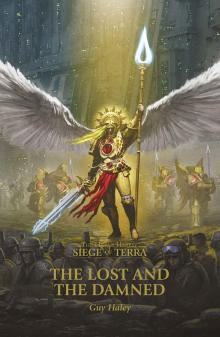 The Lost and the Damned (The Horus Heresy Siege of Terra Book 2)
The Lost and the Damned (The Horus Heresy Siege of Terra Book 2)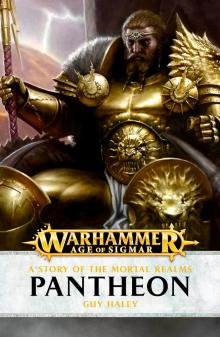 Pantheon
Pantheon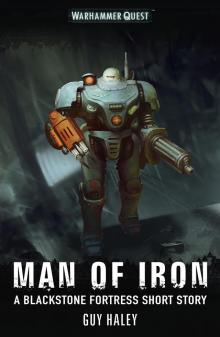 Man of Iron
Man of Iron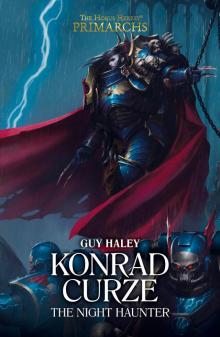 Konrad Curze the Night Haunter
Konrad Curze the Night Haunter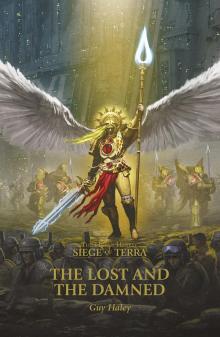 The Lost and the Damned
The Lost and the Damned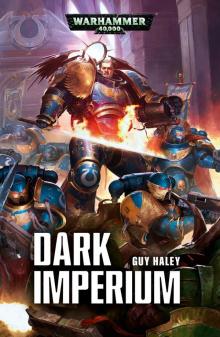 Dark Imperium
Dark Imperium Hoppo's Pies
Hoppo's Pies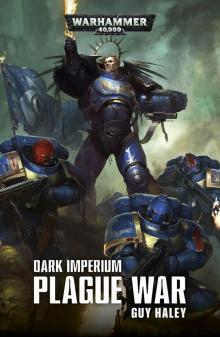 Dark Imperium: Plague War
Dark Imperium: Plague War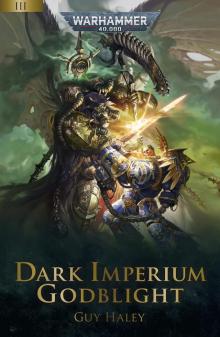 Dark Imperium: Godblight
Dark Imperium: Godblight Crash
Crash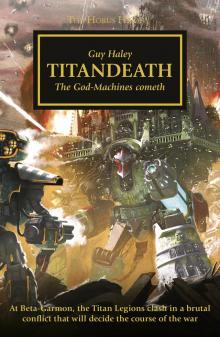 Titandeath
Titandeath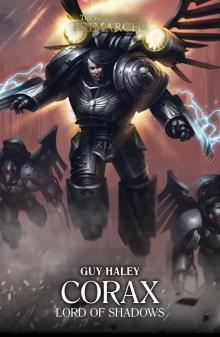 Corax- Lord of Shadows
Corax- Lord of Shadows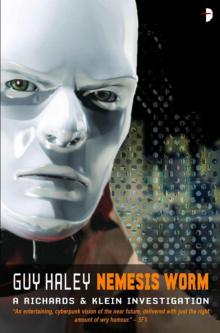 The Nemesis Worm
The Nemesis Worm Wolfsbane
Wolfsbane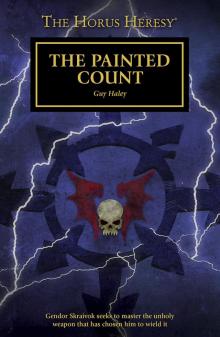 The Painted Count
The Painted Count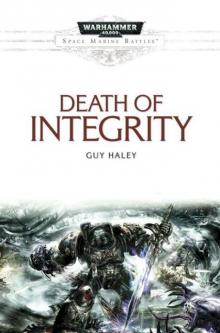 The Death of Integrity
The Death of Integrity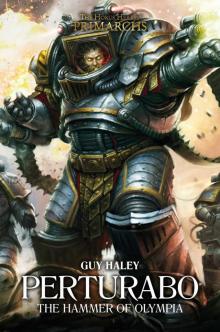 Perturabo: Hammer of Olympia
Perturabo: Hammer of Olympia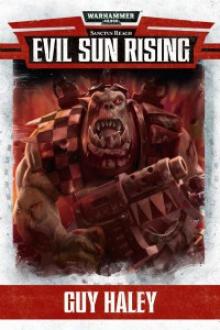 Evil Sun Rising
Evil Sun Rising The Emperor's Railroad
The Emperor's Railroad Shadowsword
Shadowsword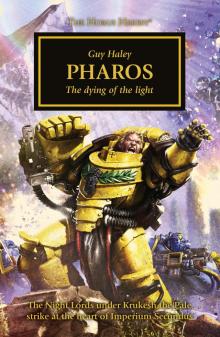 Pharos
Pharos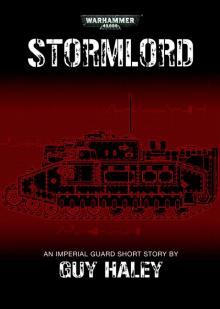 Stormlord
Stormlord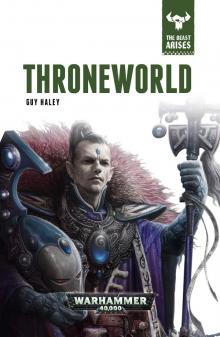 Throneworld
Throneworld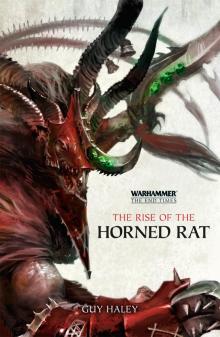 The End Times | The Rise of the Horned Rat
The End Times | The Rise of the Horned Rat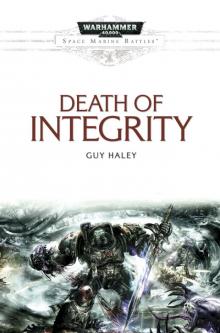 Death of Integrity
Death of Integrity Omega Point
Omega Point Omega point rak-2
Omega point rak-2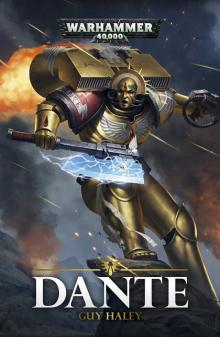 Dante
Dante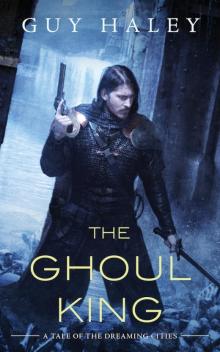 The Ghoul King
The Ghoul King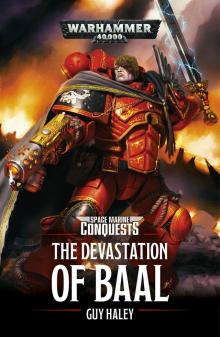 The Devastation of Baal
The Devastation of Baal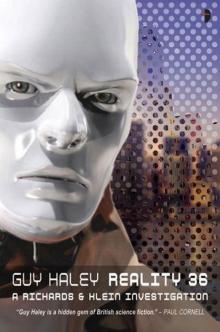 Reality 36: A Richards & Klein Novel
Reality 36: A Richards & Klein Novel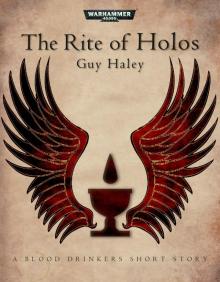 The Rite of Holos
The Rite of Holos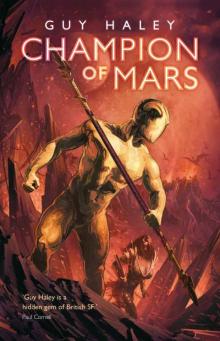 Champion of Mars
Champion of Mars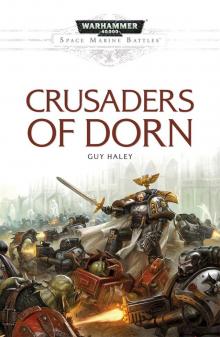 Crusaders of Dorn
Crusaders of Dorn Baneblade
Baneblade